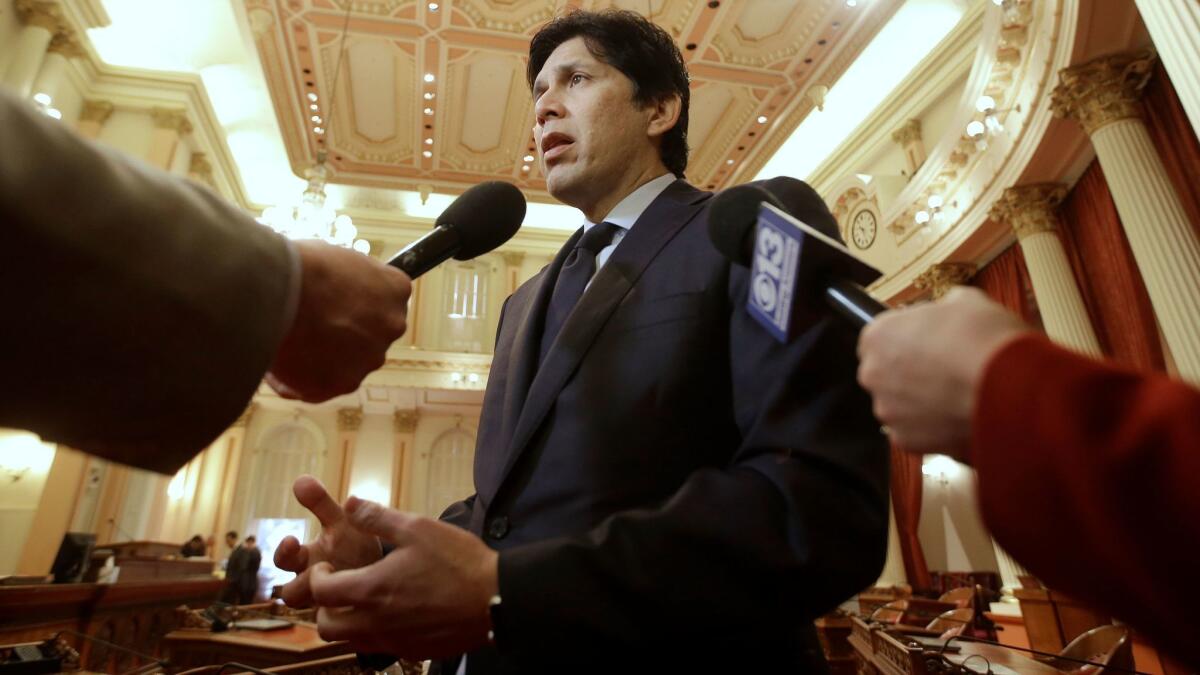Editorial: Losers in the GOP tax plan, blue states are unwisely turning to tax evasion

- Share via
Congressional Republicans say the $1.5-trillion tax cut they passed last month will produce far more winners than losers, with the typical family of four earning the median income saving more than $2,000 this year. But the losers will be easier to find in states with high tax rates and elevated property values — like, say, California.
That’s because the law slashes a tax break that was uniquely valuable to residents of those states: the deduction for state and local property, sales and income taxes. Starting this year, taxpayers will be able to deduct no more than $10,000 in state and local tax payments per household. By comparison, the average deduction for state taxes claimed by Californians on their 2015 returns was nearly $18,500. Depending on the taxpayer’s bracket, losing $8,500 in deductions could translate into a tax increase of more than $3,000.
Similar tax hikes loom for residents of New York, Connecticut, New Jersey and other high-tax, high-cost states. But state lawmakers aren’t ready to accept the hand that Congress has dealt; instead, they’re looking at ways to change their own tax codes to help their residents evade the higher federal levy.
Their outrage at the slap from Washington is understandable; it seems hardly coincidental that congressional Republicans would target a deduction that matters most to blue states. But rather than respond with real tax reforms of their own, they’re resorting to tax-dodge gimmickry.
State lawmakers aren’t ready to accept the hand that Congress has dealt.
A case in point is the proposal Senate President Pro Tem Kevin de León (D-Los Angeles) unveiled Jan. 3 in California. De León would enable residents to contribute money to a new “California Excellence Fund” in exchange for an equal amount of tax credits — for example, a family that owed $4,000 in state taxes could contribute $4,000 to the fund and wipe out its state tax bill. They could then deduct their contribution to the fund from their federal taxable income, just as they used to do with their state tax payments. That’s because the new federal tax law leaves the deduction for charitable contributions intact, unlike the one for state and local taxes.
The Internal Revenue Service has blessed similar arrangements that California has used to raise money for college scholarships, and that several states use to preserve land from development or generate money for private school vouchers. But it’s one thing to offer a tax break to try to support a public project or service; it’s another to do it solely to cut Californians’ federal tax bills. Passing the De León bill would be the state’s version of setting up a shell company in the Cayman Islands in order to shelter Californians’ income.
Besides, the history of such donation-for-tax-credits schemes shows how vulnerable they are to abuse. Just one example: The Trump National Golf Course in Palos Verdes qualified for a multimillion-dollar state tax credit as well as a hefty federal tax write-off by granting an easement over 11.5 acres of its property to a local land conservancy, effectively preventing 16 homes from being built on the site. But the club had no apparent plans to develop the acreage — it was being used mainly as a driving range.
We get it — the GOP tax bill is bad policy piled on bad policy, and blue states feel as if their pockets are being picked to shower riches on someone else.
It’s worth remembering, though, that the deduction for state and local taxes was just one of many breaks for individual taxpayers that were eliminated or scaled back as a trade-off for a considerably larger standard deduction — a change that will benefit most taxpayers. Nationally, less than a third of households itemize deductions, although the percentage rises dramatically among those who earn more than $75,000 a year. In California, only 34% claimed a deduction for state and local taxes on their 2015 returns. It’s safe to assume that the other 66% will come out ahead under the new law.
In short, the new tax law produces winners and losers, as big changes in the tax code invariably do. With one of those changes hitting high-cost, high-tax states particularly hard, Californians are naturally suspicious and looking to fight back. There are reforms to the state tax code that could help reduce the maddening volatility of its revenue while also helping on the federal tax front — for example, by reducing income taxes in favor of new levies on carbon and services. But that’s not the approach taken by De León’s bill. Instead, it offers a clever tax-avoidance scheme, exploiting a loophole that Congress should have closed long ago to magically transform tax payments into “charitable contributions” — as if the state budget were a food bank or the Red Cross. Californians deserve a better tax overhaul than Congress just delivered, as do all Americans, but this isn’t the way to get one.
Follow the Opinion section on Twitter @latimesopinionand Facebook
More to Read
A cure for the common opinion
Get thought-provoking perspectives with our weekly newsletter.
You may occasionally receive promotional content from the Los Angeles Times.










